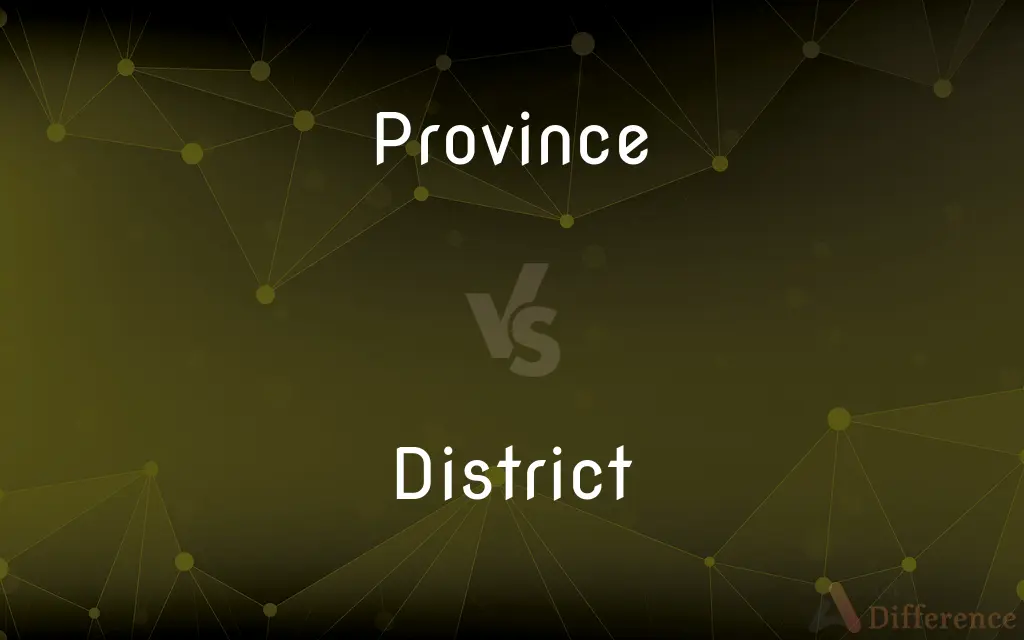Province vs. District — What's the Difference?
By Urooj Arif & Fiza Rafique — Updated on March 7, 2024
A province is a larger territorial and administrative division within a country, focusing on broad governance; a district is a smaller area within a province or country, handling local administration.

Difference Between Province and District
Table of Contents
ADVERTISEMENT
Key Differences
A province is a primary administrative division within a country, often with its own government and administrative responsibilities, reflecting a level of autonomy. Whereas, a district is a subdivision within a province or country, focusing on more localized administrative tasks and services.
Provinces typically cover a larger geographical area and encompass a wide variety of communities, landscapes, and possibly districts. On the other hand, districts are smaller, concentrating on the needs of more specific, often homogeneous populations within their boundaries.
The role of a province usually includes broader legislative powers, regional development, and implementation of national policies at the provincial level. In contrast, districts are primarily concerned with local governance, such as law enforcement, education, and infrastructure maintenance.
Provinces may have significant cultural, historical, or economic significance that defines broader regional identities within a country. Districts, however, often represent administrative convenience, designed to streamline governance and service delivery to local populations.
In terms of governance, the head of a province, such as a governor, is often appointed or elected with considerable authority over wide-ranging aspects of administration and policy. Meanwhile, the leadership of a district, such as a district commissioner or a mayor, usually focuses on executing policies, regulations, and services at a local level.
ADVERTISEMENT
Comparison Chart
Scope
Large geographical area
Smaller, localized area within a province
Administration
Own government, broad powers
Local governance, focused responsibilities
Governance
Led by a governor or equivalent
Often headed by a district commissioner
Functions
Broad: policy implementation, development
Localized: education, infrastructure, law
Significance
Cultural, economic, historical identity
Administrative convenience, local services
Compare with Definitions
Province
A territory distinguished by its people, culture, or geography.
The coastal provinces have distinct maritime cultures.
District
A defined area within a country for administrative purposes.
The school district oversees education within its boundaries.
Province
A primary administrative division within a country.
The province of Ontario in Canada is known for its large population and economic significance.
District
A region marked for local governance.
The district is known for its community programs.
Province
A region under the jurisdiction of a particular government.
The provinces have a level of autonomy from the federal government.
District
An area under the jurisdiction of a particular official.
The police district is patrolled by the local precinct.
Province
A division for political or administrative purposes.
The country is divided into several provinces, each with its own governor.
District
A subdivision of a province or state.
The district has a unique cultural heritage within the province.
Province
A geographical area with its own local government.
She visited the wine-producing provinces in the country’s south.
District
An area designated for specific administrative functions.
The commercial district is bustling with new developments.
Province
A province is almost always an administrative division within a country or state. The term derives from the ancient Roman provincia, which was the major territorial and administrative unit of the Roman Empire's territorial possessions outside Italy.
District
A district is a type of administrative division that, in some countries, is managed by the local government. Across the world, areas known as "districts" vary greatly in size, spanning regions or counties, several municipalities, subdivisions of municipalities, school district, or political district.
Province
A principal administrative division of a country or empire
Chengdu, capital of Sichuan province
District
A division of an area, as for administrative purposes.
Province
The whole of a country outside the capital, especially when regarded as lacking in sophistication or culture
I made my way home to the dreary provinces by train
District
A region or locality marked by a distinguishing feature
Went to the lake district for their vacation.
Province
An area of special knowledge, interest, or responsibility
She knew little about wine—that had been her father's province
District
To mark off or divide into districts.
Province
A territory governed as an administrative or political unit of a country or empire.
District
An administrative division of an area.
The Soho district of London
Province
(Ecclesiastical) A division of territory under the jurisdiction of a metropolitan.
District
An area or region marked by some distinguishing feature.
The Lake District in Cumbria
Province
Provinces Areas of a country situated away from the capital or population center.
District
(UK) An administrative division of a county without the status of a borough.
South Oxfordshire District Council
Province
An area of knowledge, activity, or interest
A topic falling within the province of ancient history.
District
(transitive) To divide into administrative or other districts.
Province
The range of one's proper duties and functions; scope.
District
(obsolete) rigorous; stringent; harsh
Province
(Ecology) An area of land, less extensive than a region, having a characteristic plant and animal population.
District
Rigorous; stringent; harsh.
Punishing with the rod of district severity.
Province
Any of various lands outside Italy conquered by the Romans and administered by them as self-contained units.
District
The territory within which the lord has the power of coercing and punishing.
Province
A region of the earth or of a continent; a district or country.
District
A division of territory; a defined portion of a state, town, or city, etc., made for administrative, electoral, or other purposes; as, a congressional district, judicial district, land district, school district, etc.
To exercise exclusive legislation . . . over such district not exceeding ten miles square.
Province
An administrative subdivision of certain countries, including Canada and China.
District
Any portion of territory of undefined extent; a region; a country; a tract.
These districts which between the tropics lie.
Province
(Roman history) An area outside Italy which is administered by a Roman governor.
District
To divide into districts or limited portions of territory; as, legislatures district States for the choice of representatives.
Province
(Christianity) An area under the jurisdiction of an archbishop, typically comprising a number of adjacent dioceses.
District
A region marked off for administrative or other purposes
Province
(Roman Catholicism) An area under the jurisdiction of a provincial within a monastic order.
District
Regulate housing in; of certain areas of towns
Province
The parts of a country outside its capital city.
Province
An area of activity, responsibility or knowledge; the proper concern of a particular person or concept.
Province
A country or region, more or less remote from the city of Rome, brought under the Roman government; a conquered country beyond the limits of Italy.
Province
A country or region dependent on a distant authority; a portion of an empire or state, esp. one remote from the capital.
Province
A region of country; a tract; a district.
Over many a tractof heaven they marched, and many a province wide.
Other provinces of the intellectual world.
Province
A region under the supervision or direction of any special person; the district or division of a country, especially an ecclesiastical division, over which one has jurisdiction; as, the province of Canterbury, or that in which the archbishop of Canterbury exercises ecclesiastical authority.
Province
The proper or appropriate business or duty of a person or body; office; charge; jurisdiction; sphere.
The woman'sprovince is to be careful in her economy, and chaste in her affection.
Province
Specif.: Any political division of the Dominion of Canada, having a governor, a local legislature, and representation in the Dominion parliament. Hence, colloquially, The Provinces, the Dominion of Canada.
Province
The territory occupied by one of the constituent administrative districts of a nation;
His state is in the deep south
Province
The proper sphere or extent of your activities;
It was his province to take care of himself
Common Curiosities
What are the administrative roles of provinces?
Provinces have broad legislative powers, handle regional development, and implement national policies at a regional level.
What kind of governance is found in districts?
Districts focus on local governance, including law enforcement, education, and infrastructure maintenance.
How do provinces differ from districts in terms of size?
Provinces cover larger geographical areas and encompass a variety of communities, whereas districts are smaller, more localized areas.
Who is responsible for governing a district?
A district is usually governed by a district commissioner, mayor, or a similar local authority.
Do provinces have cultural significance?
Yes, provinces often have cultural, historical, or economic significance that defines regional identities within a country.
What is a district?
A district is a smaller administrative division within a country or province, focusing on local governance and services.
Who leads the administration of a province?
A province is typically led by a governor or an equivalent authority with significant administrative powers.
Are districts independent from provinces?
Districts are not independent; they are subdivisions within provinces or countries, designed for administrative efficiency.
How do provinces and districts contribute to national governance?
Provinces contribute by implementing national policies at a regional level, while districts ensure governance and services are adapted to local needs.
What is a province?
A province is a large administrative division within a country, with its own government and broad governance responsibilities.
Can a province contain multiple districts?
Yes, a province can contain multiple districts, each with its own specific local governance structure.
How does the governance structure differ between provinces and districts?
Provinces have a broader governance structure with more autonomy, while districts focus on executing local policies and services.
What is the main purpose of districts?
The main purpose of districts is to streamline governance and service delivery to local populations.
Can the boundaries of provinces and districts change?
Yes, the boundaries of both provinces and districts can change due to administrative decisions or political reforms.
What role do provinces and districts play in education and law enforcement?
Provinces may set broad educational and law enforcement policies, while districts are responsible for the local execution and management of these services.
Share Your Discovery

Previous Comparison
Anterior vs. Posterior
Next Comparison
Baccalaureate vs. BachelorAuthor Spotlight
Written by
Urooj ArifUrooj is a skilled content writer at Ask Difference, known for her exceptional ability to simplify complex topics into engaging and informative content. With a passion for research and a flair for clear, concise writing, she consistently delivers articles that resonate with our diverse audience.
Co-written by
Fiza RafiqueFiza Rafique is a skilled content writer at AskDifference.com, where she meticulously refines and enhances written pieces. Drawing from her vast editorial expertise, Fiza ensures clarity, accuracy, and precision in every article. Passionate about language, she continually seeks to elevate the quality of content for readers worldwide.















































